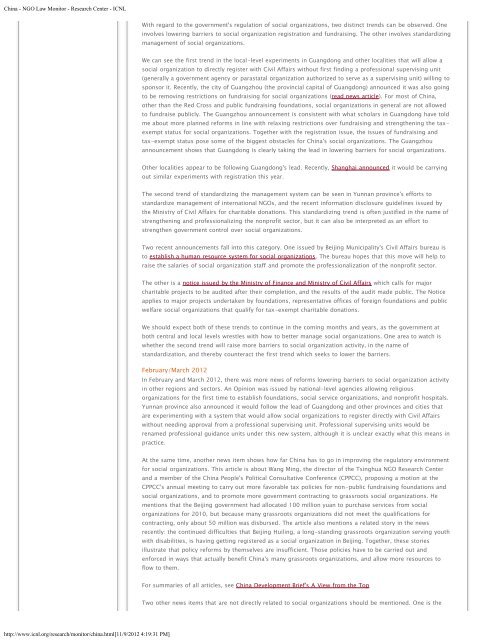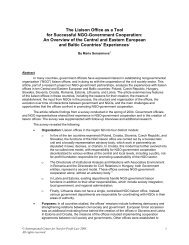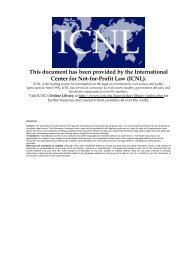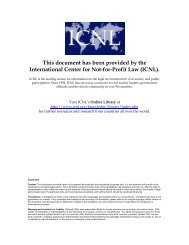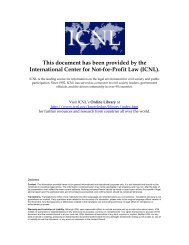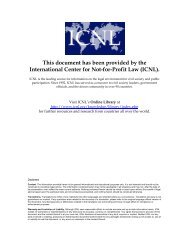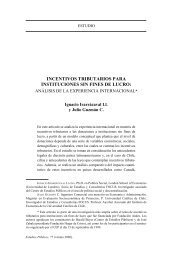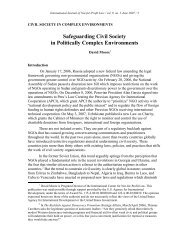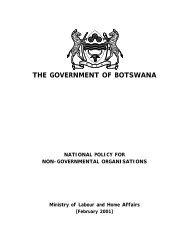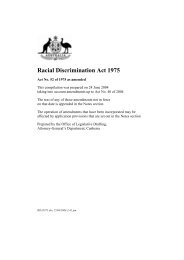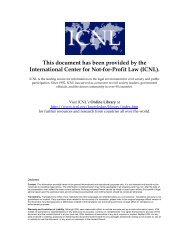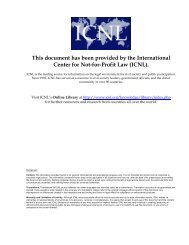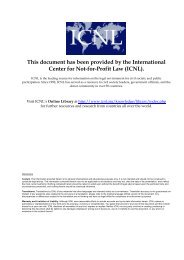NGO Law Monitor: China RESEARCH CENTER - The International ...
NGO Law Monitor: China RESEARCH CENTER - The International ...
NGO Law Monitor: China RESEARCH CENTER - The International ...
Create successful ePaper yourself
Turn your PDF publications into a flip-book with our unique Google optimized e-Paper software.
<strong>China</strong> - <strong>NGO</strong> <strong>Law</strong> <strong>Monitor</strong> - Research Center - ICNL<br />
http://www.icnl.org/research/monitor/china.html[11/9/2012 4:19:31 PM]<br />
With regard to the government's regulation of social organizations, two distinct trends can be observed. One<br />
involves lowering barriers to social organization registration and fundraising. <strong>The</strong> other involves standardizing<br />
management of social organizations.<br />
We can see the first trend in the local-level experiments in Guangdong and other localities that will allow a<br />
social organization to directly register with Civil Affairs without first finding a professional supervising unit<br />
(generally a government agency or parastatal organization authorized to serve as a supervising unit) willing to<br />
sponsor it. Recently, the city of Guangzhou (the provincial capital of Guangdong) announced it was also going<br />
to be removing restrictions on fundraising for social organizations (read news article). For most of <strong>China</strong>,<br />
other than the Red Cross and public fundraising foundations, social organizations in general are not allowed<br />
to fundraise publicly. <strong>The</strong> Guangzhou announcement is consistent with what scholars in Guangdong have told<br />
me about more planned reforms in line with relaxing restrictions over fundraising and strengthening the taxexempt<br />
status for social organizations. Together with the registration issue, the issues of fundraising and<br />
tax-exempt status pose some of the biggest obstacles for <strong>China</strong>'s social organizations. <strong>The</strong> Guangzhou<br />
announcement shows that Guangdong is clearly taking the lead in lowering barriers for social organizations.<br />
Other localities appear to be following Guangdong's lead. Recently, Shanghai announced it would be carrying<br />
out similar experiments with registration this year.<br />
<strong>The</strong> second trend of standardizing the management system can be seen in Yunnan province's efforts to<br />
standardize management of international <strong>NGO</strong>s, and the recent information disclosure guidelines issued by<br />
the Ministry of Civil Affairs for charitable donations. This standardizing trend is often justified in the name of<br />
strengthening and professionalizing the nonprofit sector, but it can also be interpreted as an effort to<br />
strengthen government control over social organizations.<br />
Two recent announcements fall into this category. One issued by Beijing Municipality's Civil Affairs bureau is<br />
to establish a human resource system for social organizations. <strong>The</strong> bureau hopes that this move will help to<br />
raise the salaries of social organization staff and promote the professionalization of the nonprofit sector.<br />
<strong>The</strong> other is a notice issued by the Ministry of Finance and Ministry of Civil Affairs which calls for major<br />
charitable projects to be audited after their completion, and the results of the audit made public. <strong>The</strong> Notice<br />
applies to major projects undertaken by foundations, representative offices of foreign foundations and public<br />
welfare social organizations that qualify for tax-exempt charitable donations.<br />
We should expect both of these trends to continue in the coming months and years, as the government at<br />
both central and local levels wrestles with how to better manage social organizations. One area to watch is<br />
whether the second trend will raise more barriers to social organization activity, in the name of<br />
standardization, and thereby counteract the first trend which seeks to lower the barriers.<br />
February/March 2012<br />
In February and March 2012, there was more news of reforms lowering barriers to social organization activity<br />
in other regions and sectors. An Opinion was issued by national-level agencies allowing religious<br />
organizations for the first time to establish foundations, social service organizations, and nonprofit hospitals.<br />
Yunnan province also announced it would follow the lead of Guangdong and other provinces and cities that<br />
are experimenting with a system that would allow social organizations to register directly with Civil Affairs<br />
without needing approval from a professional supervising unit. Professional supervising units would be<br />
renamed professional guidance units under this new system, although it is unclear exactly what this means in<br />
practice.<br />
At the same time, another news item shows how far <strong>China</strong> has to go in improving the regulatory environment<br />
for social organizations. This article is about Wang Ming, the director of the Tsinghua <strong>NGO</strong> Research Center<br />
and a member of the <strong>China</strong> People's Political Consultative Conference (CPPCC), proposing a motion at the<br />
CPPCC's annual meeting to carry out more favorable tax policies for non-public fundraising foundations and<br />
social organizations, and to promote more government contracting to grassroots social organizations. He<br />
mentions that the Beijing government had allocated 100 million yuan to purchase services from social<br />
organizations for 2010, but because many grassroots organizations did not meet the qualifications for<br />
contracting, only about 50 million was disbursed. <strong>The</strong> article also mentions a related story in the news<br />
recently: the continued difficulties that Beijing Huiling, a long-standing grassroots organization serving youth<br />
with disabilities, is having getting registered as a social organization in Beijing. Together, these stories<br />
illustrate that policy reforms by themselves are insufficient. Those policies have to be carried out and<br />
enforced in ways that actually benefit <strong>China</strong>'s many grassroots organizations, and allow more resources to<br />
flow to them.<br />
For summaries of all articles, see <strong>China</strong> Development Brief's A View from the Top<br />
Two other news items that are not directly related to social organizations should be mentioned. One is the


